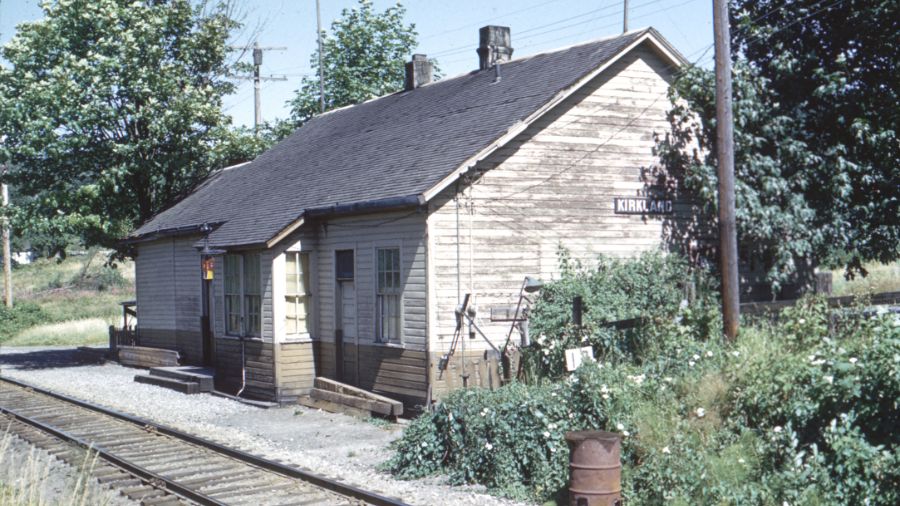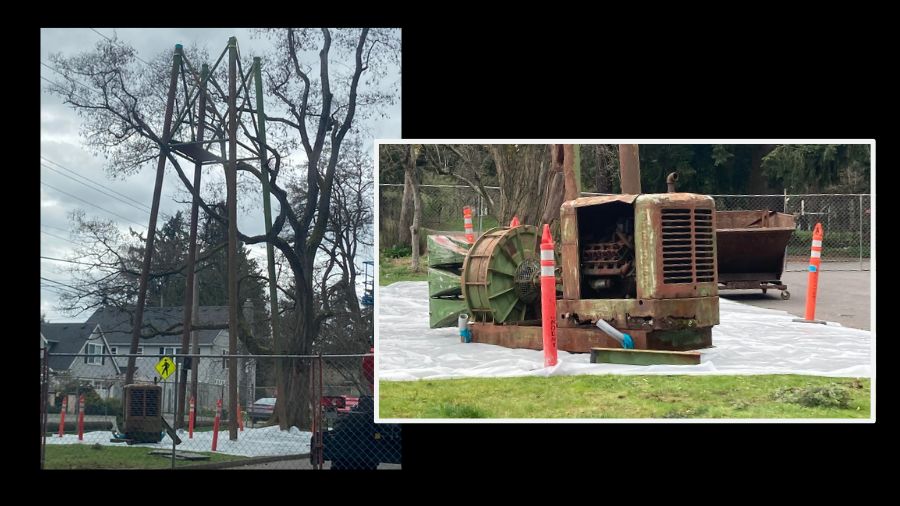Officials, historians slam ‘horrendous’ plan to close Seattle National Archives
Jan 22, 2020, 8:12 AM | Updated: 11:58 am

The fate of the National Archives' facility in Seattle's Sand Point neighborhood is in the hands of the Office of Management and Budget, with no input from the public. (Feliks Banel for KIRO Radio)
(Feliks Banel for KIRO Radio)
As KIRO Radio listeners learned recently, Seattle’s National Archives facility, a fixture in the city’s Sand Point neighborhood since 1963, may be sold, and the contents shipped to Riverside, California.
This facility sits on 10 acres across the street from Magnuson Park, and is operated by the National Archives and Records Administration (NARA). The building is an old U.S. Navy warehouse built in the 1940s that was converted to a federal archives in 1963.
It holds millions of documents, photos and maps — all federal records — for Washington, Oregon, Idaho and Alaska, dating all the way back to the 1840s. These are foundational documents — essentially, the administrative and bureaucratic DNA — from the tumultuous years when the Native ground of the Pacific Northwest officially became part of the United States.
The research room there is open to the public, and is used by professional and amateur historians, students, legal researchers, genealogists, and Native Americans to access priceless historical records for a multitude of cultural, legal and other purposes. Only a tiny fraction has been digitized or is available online.
As it turns out, the Sand Point facility quietly made it onto a list of a dozen federally owned “high value assets” that the federal government wants to sell through an expedited process, as part of a law that Congress passed in 2016 and was signed by President Obama.
A federal agency called the Public Buildings Reform Board (PBRB) put the list together, and submitted it to the Office of Management and Budget for approval. With no formal public engagement process, the OMB will decide by Sunday, Jan. 26 whether or not to accept the recommendations of the PBRB.
Pacific Northwest historians and others who care about these sorts of things (full disclosure: Myself included), simply don’t want these valuable and one-of-a-kind materials to leave Seattle.
However, even for those who couldn’t care less about history or archival treasures, the utter lack of public process before deciding the fate of a building that has served a critical role for nearly 60 years doesn’t feel right.
Since KIRO Radio and MyNorthwest first shared this story last Wednesday, countless people have reacted on social media and sent letters to elected officials. Several people have expressed a feeling of being blindsided, and then frustrated by having no formal way to lodge a complaint. At least two KIRO Radio listeners sent messages to noted historian Henry Louis Gates Jr. asking for his help.
The reaction has been particularly swift and angry in Alaska. Historians and others there feel twice-burned, because the Anchorage facility of the National Archives was shut down in 2014, and much of the material was sent to Seattle. As with the materials from Washington, Oregon and Idaho, only a tiny fraction of the Alaska materials have been digitized.
Alaska historian Pennelope Goforth is particularly incensed.
“There should have been more of a public process,” Goforth said by phone on Sunday. “Although, I guess in their defense, when you talk about ‘public asset reform,’ people just go to sleep.”
The failure of the Public Buildings Reform Board, OMB, or any of the elected officials who knew about the possible closure and sale of the Seattle facility to seek public input is an egregious way to implement a program whose goals are government efficiency, Goforth says.
“This turned out to be really horrendous,” she said.
Since late last week, Goforth has led a grassroots opposition effort in Alaska and mobilized historical organizations and elected officials to voice their support for keeping the Seattle facility open. Goforth shared letters of support from the presidents of the Cook Inlet Historical Society and the Alaska Historical Society.
Also since late last week, KIRO Radio has reached out multiple times to the staff of U.S. Representative Pramila Jayapal, Seattle Mayor Jenny Durkan, and Seattle City Councilmember Alex Pedersen to gauge these officials’ reactions to the news, and to ask what each was willing to do to try and keep the National Archives facility from closing down.
On Tuesday, Rep. Jayapal wrote:
I’m deeply troubled that the Public Buildings Reform Board [PBRB] neglected to brief state and local elected officials or engage the local public on their proposal to sell the NARA [National Archives and Records Administration] facility in Sand Point, Seattle. When the PBRB contacted my office, they notified my staff that they intended to conduct outreach to state and local officials and stakeholders — critical input when the federal government is proposing to close facilities that serve the public. I urge OMB to withhold approval on the PBRB‘s recommendations until it consults with state and local officials and engages the public.
Rep. Jayapal’s staff also provided the following:
As our office has delved into this issue because of news reports and constituent feedback, it is now clear that that the PBRB failed to engage the Mayor, City Council, or other local leaders in its process. There have also been no general opportunities for the public to engage or provide feedback on the proposal. The law clearly requires that PBRB ‘consult with State and local officials on information, proposals, and other data that the officials submit to the Board’ and ‘conduct public hearings.’ Rep. Jayapal believes these are important steps and no sale should go forward until the local community has had a chance to weigh in. Rep. Jayapal will be sending a letter to OMB calling on them to withhold approval of PBRB’s recommendations until such a process has been initiated and completed.
Also on Tuesday, Kamaria Hightower, a spokesperson for Seattle Mayor Jenny Durkan wrote:
Unfortunately, this move by the Office of Management and Budget has had limited input from our community, stakeholders and the tribes[,] and comes as a surprise to leaders not only in our state but [also] Alaska, Idaho, and Oregon. Mayor Durkan has had discussions with members of the federal delegation about this issue.
A staff member from the office of one of Washington’s United States Senators said late last night that they are tracking the issue and are aware of the looming January 26 deadline, despite being otherwise occupied with the impeachment trial that began Tuesday in the Senate.
Seattle City Councilmember Alex Pedersen — whose district includes the National Archives — also responded:
Thank you to Feliks Banel for originating this news story about a federal agency that is recommending the sale of the Federal Archives and Records Center located at 6125 Sand Point Way NE, Seattle, WA 98115. This 73-year old building is located in the congressional district of U.S. Representative Pramila Jayapal and my City Council District 4 near the neighborhoods of Hawthorne Hills, Belvedere Terrace, Windermere, and Magnuson Park.
I was contacted by the federal government for the first time on Monday, January 13, 2020, specifically by the Public Buildings Reform Board (PBRB). According to the PBRB, this was the first time they had reached out to local government regarding the sale of this property, though they stated they had already contacted Congresswoman Jayapal’s office as well as the staff of U.S. Senators Murray and Cantwell.
Over the past week I alerted community leaders, the University of Washington, the City of Seattle’s Office of Intergovernmental Relations, the Mayor’s Office and, the Mayor’s Office of Housing. I also requested a briefing by the PBRB, which they are offering to provide in mid-February. As Mr. Banel has accurately noted, this is after the January 26 deadline for which the U.S. Office of Management and Budget (OMB) will decide to approve or reject the plans for this property.
My office let PBRB know that this timeline is unacceptable and we are in the process of scheduling a phone call with their office before January 26. I also told PBRB I am concerned about what appears to be a lack of public engagement for the proposed sale of the property. As I understand it, the law which is the basis for the proposed sale (the Federal Asset Sale and Transfer Act of 2016) requires public engagement as well as local public hearings sponsored by the federal agency.
My team will continue to follow this issue closely and bring much needed accountability, transparency, and public discourse to this process.
And last but not least, should the OMB decision go forward and the process to close and sell the Seattle National Archives facility kicks into high gear, KIRO Radio reached out to the office of Washington State Attorney General Bob Ferguson to ask if would he consider a lawsuit to reverse the decision.
In an email Tuesday, Attorney General Ferguson’s communications director Brionna Aho wrote:
As [Attorney General] Ferguson always says, he has three criteria he looks at before filing a lawsuit: Are Washingtonians being harmed, do we have standing to bring a lawsuit, and do we have good legal arguments. I wouldn’t get more specific than that at this time.
A PBRB staff member said they will post the OMB decision on their website as soon as it becomes available. It’s not clear if the decision will be made on January 26, or if that is the latest the decision could be made.
In the meantime, in lieu of a formal public input process, messages may be sent to elected officials and to the national office of the National Archives, the Public Buildings Reform Board, and the OMB.













